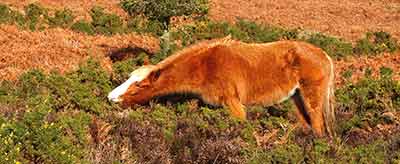Fox cubs - fox cub behaviour
(1) Fox cubs - the waiting game
Fox cubs have to be patient when awaiting the return of a parent with food.
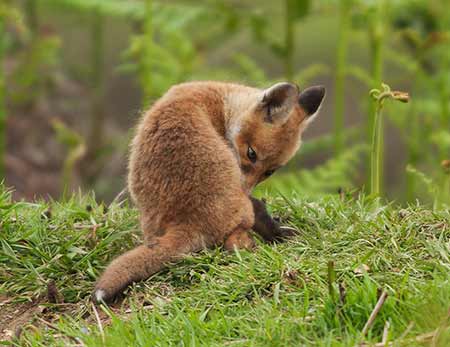
The time is usually spent simply sitting or lying about the area of the den, wrestling and 'play' fighting with siblings, grooming themselves and each other, pouncing on bracken stems as if the stems were hunted animals, and exploring and generally wandering about, sometimes in search of tasty earthworm and insect morsels amongst the grass or leaf litter.
(2) At last, food is delivered
Fox cubs are typically fed on relatively large prey items, such as rabbits, birds and, in the New Forest, probably squirrels. Rabbits certainly provide a good feed for multiple hungry youngsters, but whilst the cubs' milk teeth remain, cannot easily be consumed without first being pulled apart.
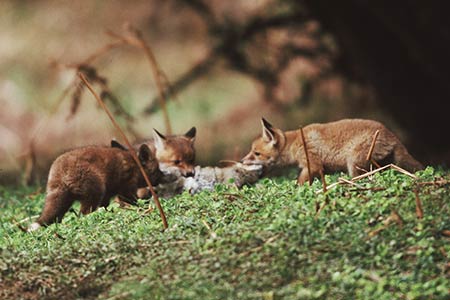
A tug-of-war (seen underway here) helps break open the prey whilst also ensuring that the larger, more dominant cubs enjoy the lion's share of the spoils.
(3) Disturbance at the den - friend or foe?
Foxes are intelligent creatures and quickly realise that two-legged, human visitors to the den potentially mean trouble. In contrast, other animals - deer, ponies and cattle, for example - are not a threat. This cub is curious about the intentions of the grazing pony nearby and wants to investigate, but shows no sign of fear.
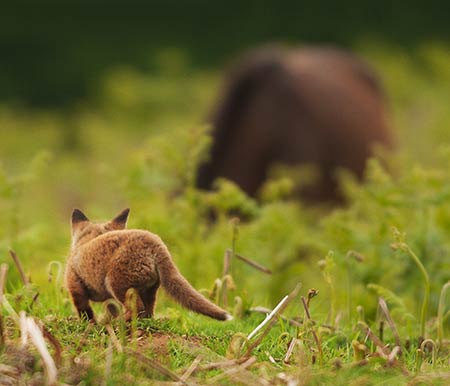
(4) 'Play' fights help to establish and maintain the cubs' status within the group
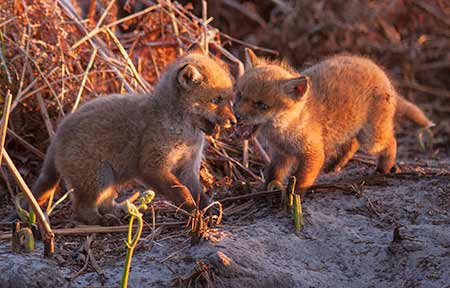
Fox cubs have all the appeal of charming, cuddly puppies, and that's not surprising as red foxes are members of the dog family. But beneath the appealing exterior, there is a lot going on under the bonnet in preparation for the harsh, wild world they're faced with whilst in and around the den, and in later life as adults.
Frequent 'play' fights take place amongst very young cubs, to help establish and maintain status within the group and as an aid to honing hunting skills in preparation for the rigours of the world away from the den.
Some fights seem to simply be fun activities, but the one shown here was none-too-friendly - it's perhaps not surprising that weaker animals try to stay well away from stronger rivals. Hierarchies amongst the cubs are apparently well-established by the time they are seven or eight weeks old, and serious fights after that time are unusual.
A series of videos are available here which include examples of fox cubs 'play' fighting - Fox cubs 'play' fighting.
(5) Dominant cubs survive; the weak may perish
Some years ago, I watched cubs at a den and noticed on a number of occasions within a few days, a very small, weak-looking cub curled up in bracken beside a holly bush at least 50 metres from the main den area. It didn't attempt to move away, but simply stared back at me as I passed within a few feet, en-route to my watching position.
Eventually I saw it no more and assume that it perished. Maybe for whatever reason it had been ostracised by the group, or had simply tired of being persecuted by more dominant cubs, or ignored by adults that favoured the stronger animals. Whichever applied, it certainly seems unlikely that it would have had access to food so far away from the main den.
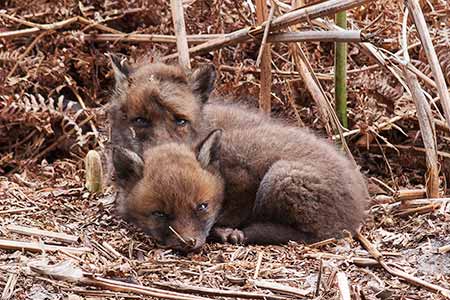
(6) And then there was one
On another occasion, two of a litter of six - tiny creatures still with much dark brown fur and 'baby' faces - spent a lot of time inactive above ground, even during the day, curled up on a den entrance spoil heap and tolerant of my nearby presence, seemingly without the energy, or not inclined, to move underground - they're shown in panel five.
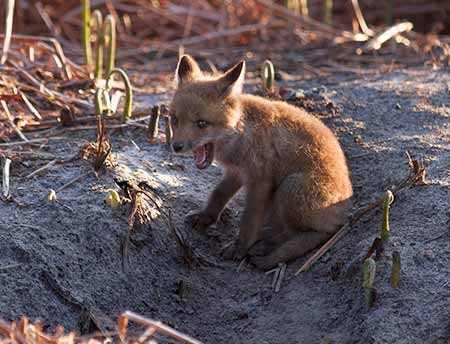
Three others in the litter were hardly more developed, whilst one was particularly well-grown, with sandy-red fur and almost fully formed foxy facial features, a dominant animal that I watched regularly target weaker siblings during bouts of 'play' fighting.
After a seven day break from watching, I returned to the den to find only the dominant cub present, frequently whining in the direction of the den's main entrance, apparently trying to coax the others out - it's shown above. No other cubs appeared, I know not why - maybe they simply remained underground, maybe they had been moved to another den, maybe they had perished for want of food or on a busy nearby road, or maybe there were other more sinister, human-related reasons for their apparent disappearance.
Find out lots more about foxes
References:
Collins Field Guide to the Mammals of Britain and Europe: David Macdonald and Priscilla Barrett
Town fox, Country fox: Brian Vesey-Fitzgerald
Animals Tracks, Trails and Signs: RW Brown, MJ Lawrence, J Pope
Collins Guide to Animal Tracks and Signs: Preben Bang and Preben Dahlstrom
Fauna Britannica: Stefan Buczacki
Running with the Fox: David Macdonald
Fox: Martin Wallen
Wild Fox: Roger Burrows
The Diary of Colonel Peter Hawker
Thirty-five Years in the New Forest: Gerald Lascelles
BBC Wildlife on-line edition
Game and Wildlife Conservation Trust
Wildlife online - fox infanticide
Quick links
More links
Search this site

